SITXGLC001 Academies Australasia Polytechnic: Regulatory Compliance
VerifiedAdded on 2023/04/08
|6
|1289
|353
Report
AI Summary
This report addresses regulatory compliance within the hospitality industry, specifically focusing on the requirements for RT Hotels. It covers obtaining an on-premises liquor license, adhering to food and beverage regulations, and implementing policies for food safety, accident reporting, and equal employment opportunity. The report also discusses the importance of responsible alcohol service (RSA) and proper food handling, transport, and storage. Furthermore, it emphasizes the need for continuous improvement through monitoring, evaluation, and training, highlighting the use of tools like AudIT at Compass Group to maintain a safe and productive environment while meeting environmental goals. The document references relevant Australian standards and legislation.
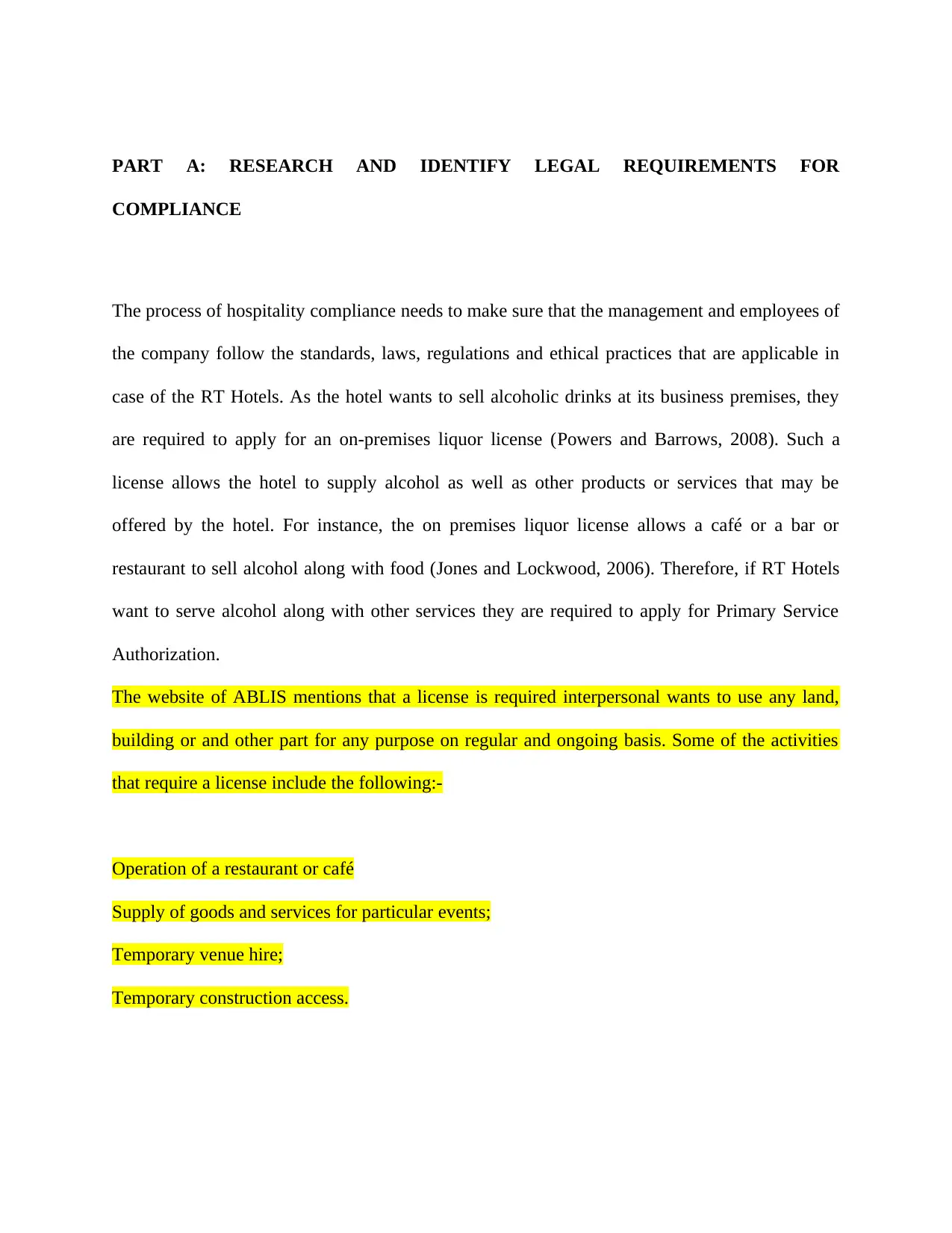
PART A: RESEARCH AND IDENTIFY LEGAL REQUIREMENTS FOR
COMPLIANCE
The process of hospitality compliance needs to make sure that the management and employees of
the company follow the standards, laws, regulations and ethical practices that are applicable in
case of the RT Hotels. As the hotel wants to sell alcoholic drinks at its business premises, they
are required to apply for an on-premises liquor license (Powers and Barrows, 2008). Such a
license allows the hotel to supply alcohol as well as other products or services that may be
offered by the hotel. For instance, the on premises liquor license allows a café or a bar or
restaurant to sell alcohol along with food (Jones and Lockwood, 2006). Therefore, if RT Hotels
want to serve alcohol along with other services they are required to apply for Primary Service
Authorization.
The website of ABLIS mentions that a license is required interpersonal wants to use any land,
building or and other part for any purpose on regular and ongoing basis. Some of the activities
that require a license include the following:-
Operation of a restaurant or café
Supply of goods and services for particular events;
Temporary venue hire;
Temporary construction access.
COMPLIANCE
The process of hospitality compliance needs to make sure that the management and employees of
the company follow the standards, laws, regulations and ethical practices that are applicable in
case of the RT Hotels. As the hotel wants to sell alcoholic drinks at its business premises, they
are required to apply for an on-premises liquor license (Powers and Barrows, 2008). Such a
license allows the hotel to supply alcohol as well as other products or services that may be
offered by the hotel. For instance, the on premises liquor license allows a café or a bar or
restaurant to sell alcohol along with food (Jones and Lockwood, 2006). Therefore, if RT Hotels
want to serve alcohol along with other services they are required to apply for Primary Service
Authorization.
The website of ABLIS mentions that a license is required interpersonal wants to use any land,
building or and other part for any purpose on regular and ongoing basis. Some of the activities
that require a license include the following:-
Operation of a restaurant or café
Supply of goods and services for particular events;
Temporary venue hire;
Temporary construction access.
Paraphrase This Document
Need a fresh take? Get an instant paraphrase of this document with our AI Paraphraser
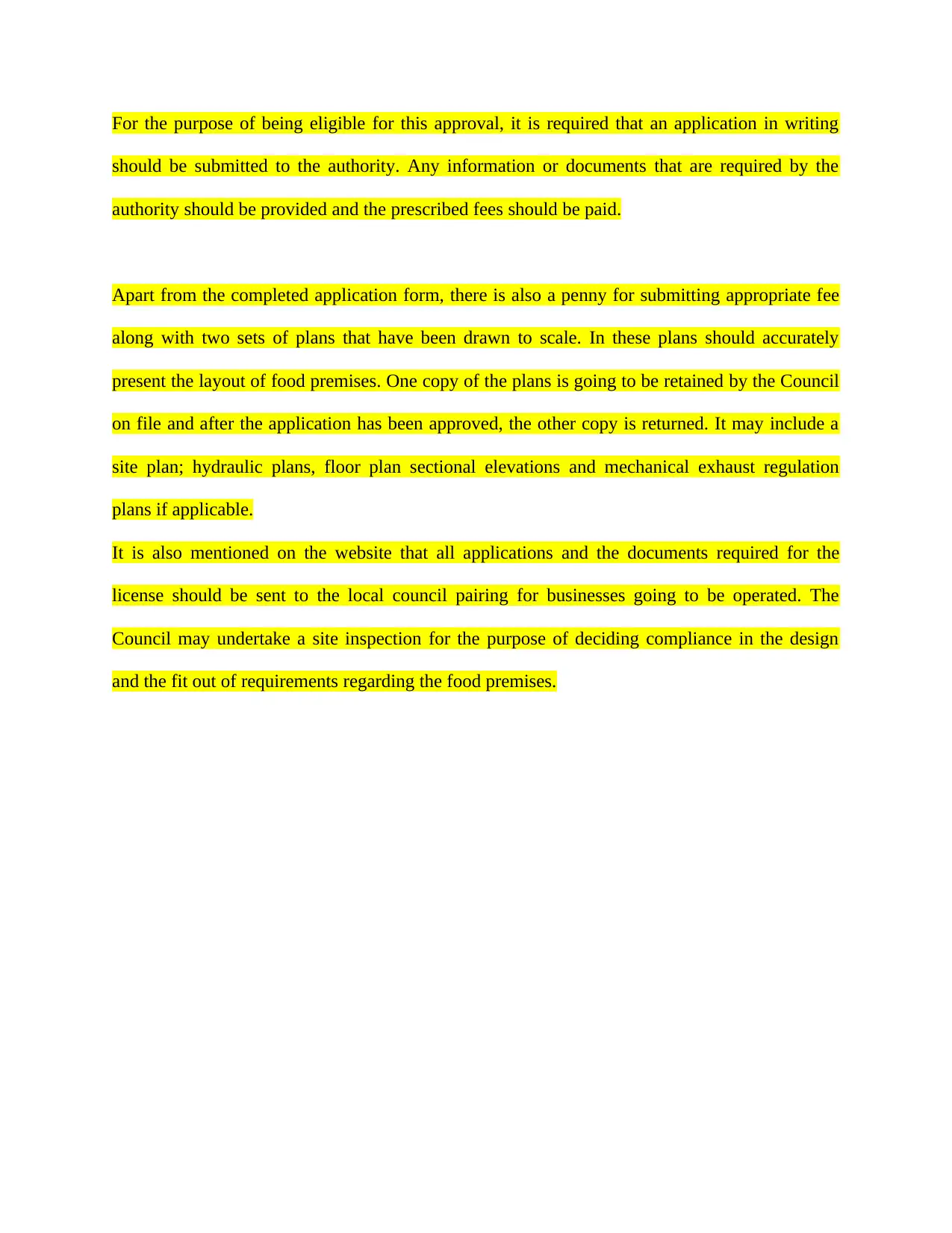
For the purpose of being eligible for this approval, it is required that an application in writing
should be submitted to the authority. Any information or documents that are required by the
authority should be provided and the prescribed fees should be paid.
Apart from the completed application form, there is also a penny for submitting appropriate fee
along with two sets of plans that have been drawn to scale. In these plans should accurately
present the layout of food premises. One copy of the plans is going to be retained by the Council
on file and after the application has been approved, the other copy is returned. It may include a
site plan; hydraulic plans, floor plan sectional elevations and mechanical exhaust regulation
plans if applicable.
It is also mentioned on the website that all applications and the documents required for the
license should be sent to the local council pairing for businesses going to be operated. The
Council may undertake a site inspection for the purpose of deciding compliance in the design
and the fit out of requirements regarding the food premises.
should be submitted to the authority. Any information or documents that are required by the
authority should be provided and the prescribed fees should be paid.
Apart from the completed application form, there is also a penny for submitting appropriate fee
along with two sets of plans that have been drawn to scale. In these plans should accurately
present the layout of food premises. One copy of the plans is going to be retained by the Council
on file and after the application has been approved, the other copy is returned. It may include a
site plan; hydraulic plans, floor plan sectional elevations and mechanical exhaust regulation
plans if applicable.
It is also mentioned on the website that all applications and the documents required for the
license should be sent to the local council pairing for businesses going to be operated. The
Council may undertake a site inspection for the purpose of deciding compliance in the design
and the fit out of requirements regarding the food premises.
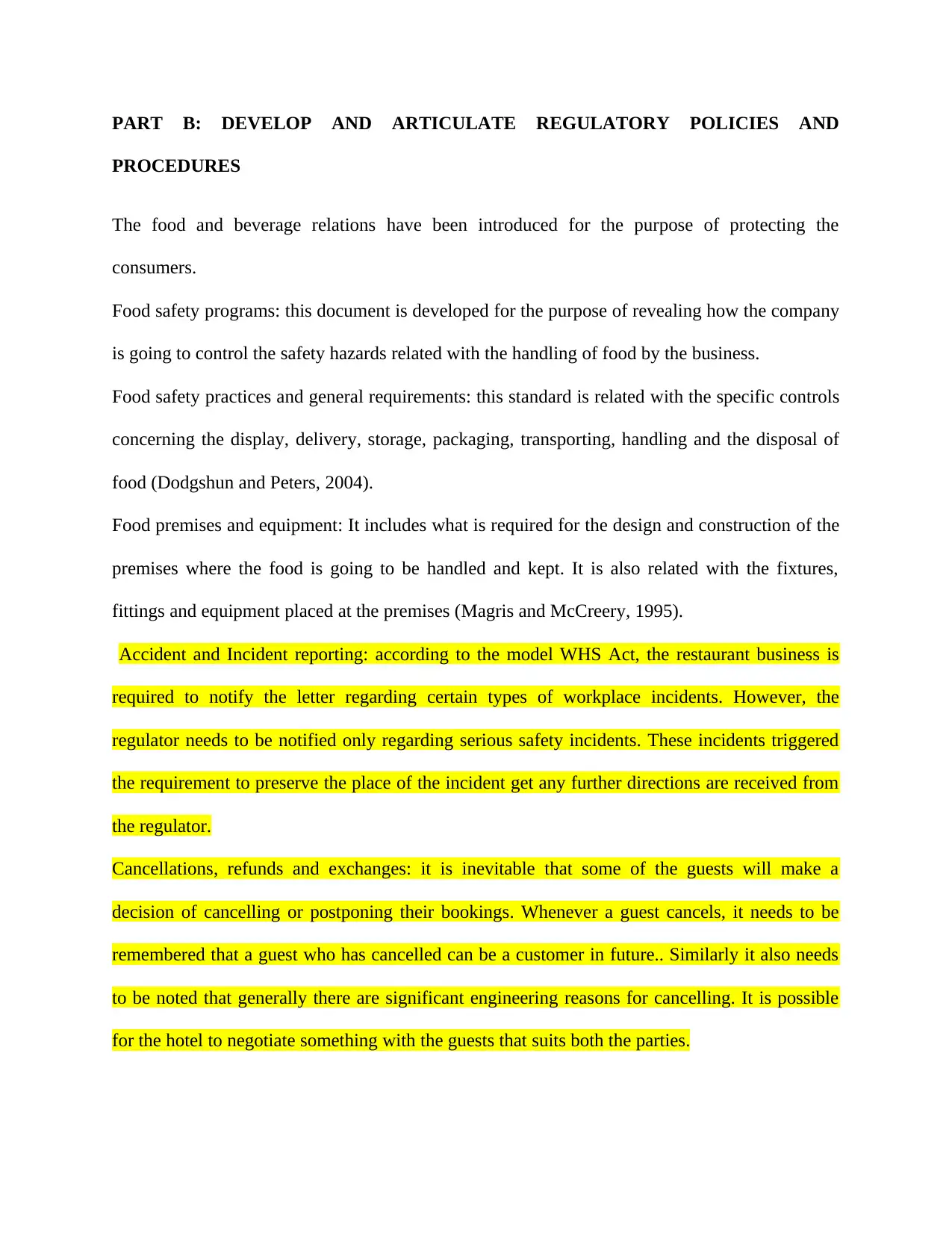
PART B: DEVELOP AND ARTICULATE REGULATORY POLICIES AND
PROCEDURES
The food and beverage relations have been introduced for the purpose of protecting the
consumers.
Food safety programs: this document is developed for the purpose of revealing how the company
is going to control the safety hazards related with the handling of food by the business.
Food safety practices and general requirements: this standard is related with the specific controls
concerning the display, delivery, storage, packaging, transporting, handling and the disposal of
food (Dodgshun and Peters, 2004).
Food premises and equipment: It includes what is required for the design and construction of the
premises where the food is going to be handled and kept. It is also related with the fixtures,
fittings and equipment placed at the premises (Magris and McCreery, 1995).
Accident and Incident reporting: according to the model WHS Act, the restaurant business is
required to notify the letter regarding certain types of workplace incidents. However, the
regulator needs to be notified only regarding serious safety incidents. These incidents triggered
the requirement to preserve the place of the incident get any further directions are received from
the regulator.
Cancellations, refunds and exchanges: it is inevitable that some of the guests will make a
decision of cancelling or postponing their bookings. Whenever a guest cancels, it needs to be
remembered that a guest who has cancelled can be a customer in future.. Similarly it also needs
to be noted that generally there are significant engineering reasons for cancelling. It is possible
for the hotel to negotiate something with the guests that suits both the parties.
PROCEDURES
The food and beverage relations have been introduced for the purpose of protecting the
consumers.
Food safety programs: this document is developed for the purpose of revealing how the company
is going to control the safety hazards related with the handling of food by the business.
Food safety practices and general requirements: this standard is related with the specific controls
concerning the display, delivery, storage, packaging, transporting, handling and the disposal of
food (Dodgshun and Peters, 2004).
Food premises and equipment: It includes what is required for the design and construction of the
premises where the food is going to be handled and kept. It is also related with the fixtures,
fittings and equipment placed at the premises (Magris and McCreery, 1995).
Accident and Incident reporting: according to the model WHS Act, the restaurant business is
required to notify the letter regarding certain types of workplace incidents. However, the
regulator needs to be notified only regarding serious safety incidents. These incidents triggered
the requirement to preserve the place of the incident get any further directions are received from
the regulator.
Cancellations, refunds and exchanges: it is inevitable that some of the guests will make a
decision of cancelling or postponing their bookings. Whenever a guest cancels, it needs to be
remembered that a guest who has cancelled can be a customer in future.. Similarly it also needs
to be noted that generally there are significant engineering reasons for cancelling. It is possible
for the hotel to negotiate something with the guests that suits both the parties.
⊘ This is a preview!⊘
Do you want full access?
Subscribe today to unlock all pages.

Trusted by 1+ million students worldwide
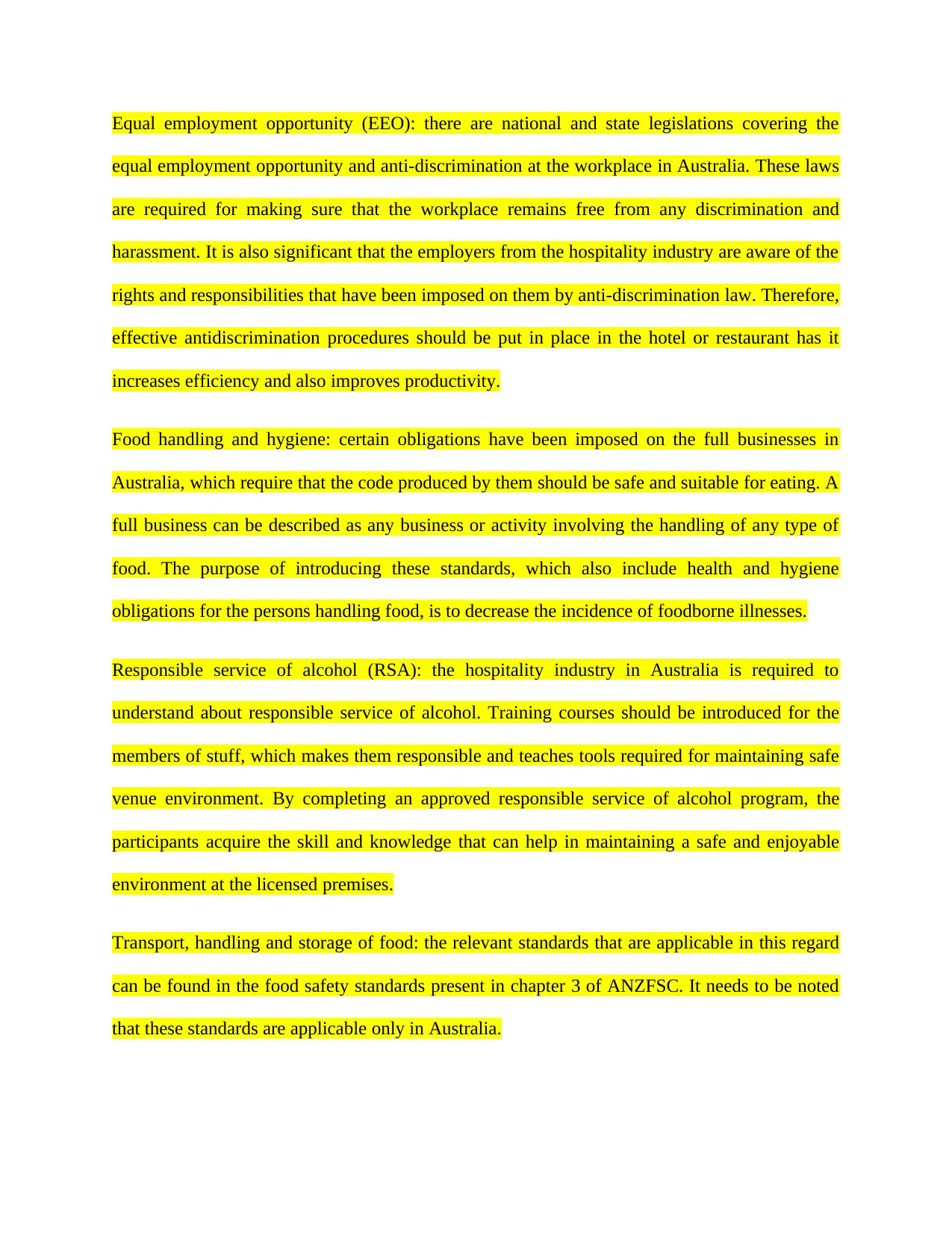
Equal employment opportunity (EEO): there are national and state legislations covering the
equal employment opportunity and anti-discrimination at the workplace in Australia. These laws
are required for making sure that the workplace remains free from any discrimination and
harassment. It is also significant that the employers from the hospitality industry are aware of the
rights and responsibilities that have been imposed on them by anti-discrimination law. Therefore,
effective antidiscrimination procedures should be put in place in the hotel or restaurant has it
increases efficiency and also improves productivity.
Food handling and hygiene: certain obligations have been imposed on the full businesses in
Australia, which require that the code produced by them should be safe and suitable for eating. A
full business can be described as any business or activity involving the handling of any type of
food. The purpose of introducing these standards, which also include health and hygiene
obligations for the persons handling food, is to decrease the incidence of foodborne illnesses.
Responsible service of alcohol (RSA): the hospitality industry in Australia is required to
understand about responsible service of alcohol. Training courses should be introduced for the
members of stuff, which makes them responsible and teaches tools required for maintaining safe
venue environment. By completing an approved responsible service of alcohol program, the
participants acquire the skill and knowledge that can help in maintaining a safe and enjoyable
environment at the licensed premises.
Transport, handling and storage of food: the relevant standards that are applicable in this regard
can be found in the food safety standards present in chapter 3 of ANZFSC. It needs to be noted
that these standards are applicable only in Australia.
equal employment opportunity and anti-discrimination at the workplace in Australia. These laws
are required for making sure that the workplace remains free from any discrimination and
harassment. It is also significant that the employers from the hospitality industry are aware of the
rights and responsibilities that have been imposed on them by anti-discrimination law. Therefore,
effective antidiscrimination procedures should be put in place in the hotel or restaurant has it
increases efficiency and also improves productivity.
Food handling and hygiene: certain obligations have been imposed on the full businesses in
Australia, which require that the code produced by them should be safe and suitable for eating. A
full business can be described as any business or activity involving the handling of any type of
food. The purpose of introducing these standards, which also include health and hygiene
obligations for the persons handling food, is to decrease the incidence of foodborne illnesses.
Responsible service of alcohol (RSA): the hospitality industry in Australia is required to
understand about responsible service of alcohol. Training courses should be introduced for the
members of stuff, which makes them responsible and teaches tools required for maintaining safe
venue environment. By completing an approved responsible service of alcohol program, the
participants acquire the skill and knowledge that can help in maintaining a safe and enjoyable
environment at the licensed premises.
Transport, handling and storage of food: the relevant standards that are applicable in this regard
can be found in the food safety standards present in chapter 3 of ANZFSC. It needs to be noted
that these standards are applicable only in Australia.
Paraphrase This Document
Need a fresh take? Get an instant paraphrase of this document with our AI Paraphraser
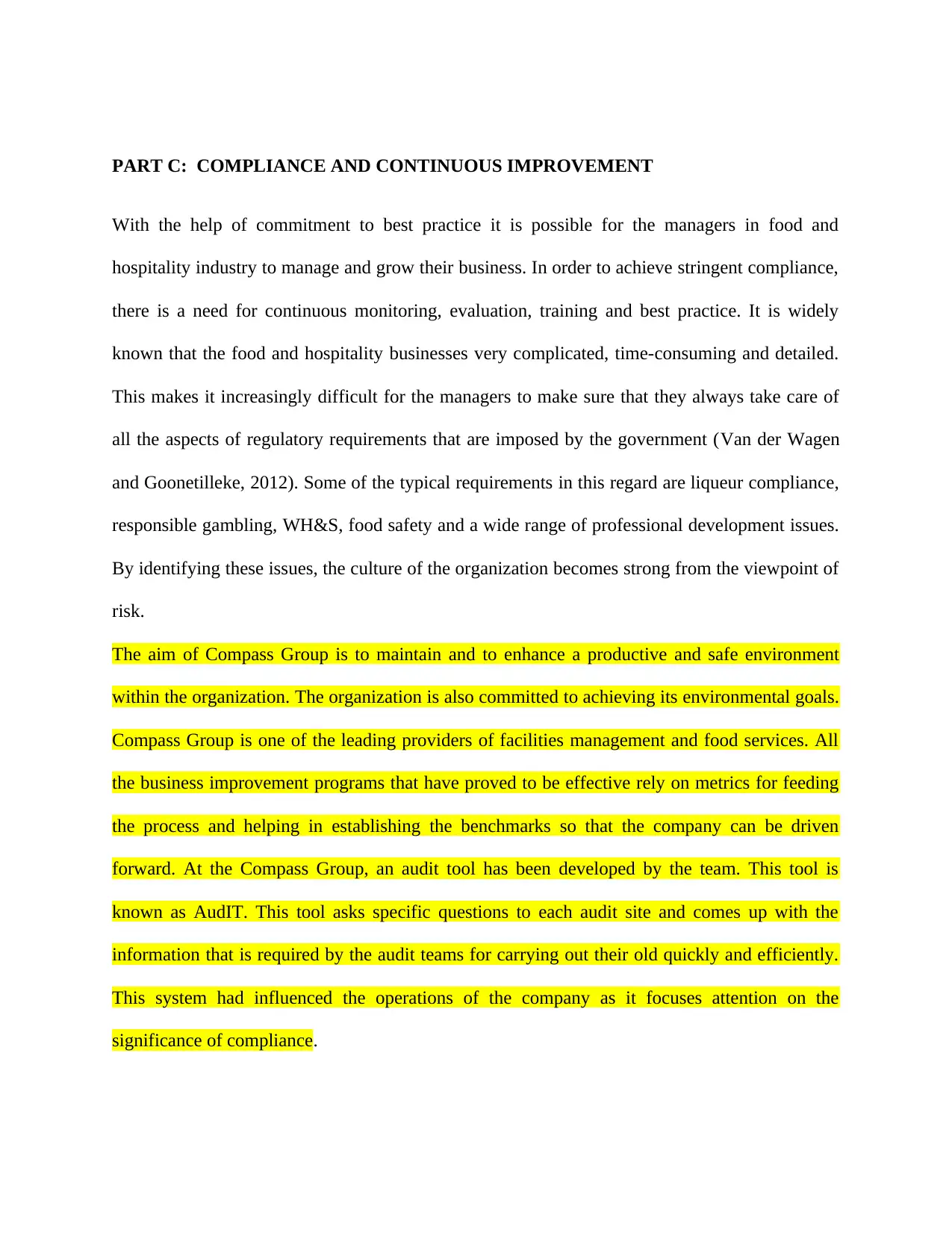
PART C: COMPLIANCE AND CONTINUOUS IMPROVEMENT
With the help of commitment to best practice it is possible for the managers in food and
hospitality industry to manage and grow their business. In order to achieve stringent compliance,
there is a need for continuous monitoring, evaluation, training and best practice. It is widely
known that the food and hospitality businesses very complicated, time-consuming and detailed.
This makes it increasingly difficult for the managers to make sure that they always take care of
all the aspects of regulatory requirements that are imposed by the government (Van der Wagen
and Goonetilleke, 2012). Some of the typical requirements in this regard are liqueur compliance,
responsible gambling, WH&S, food safety and a wide range of professional development issues.
By identifying these issues, the culture of the organization becomes strong from the viewpoint of
risk.
The aim of Compass Group is to maintain and to enhance a productive and safe environment
within the organization. The organization is also committed to achieving its environmental goals.
Compass Group is one of the leading providers of facilities management and food services. All
the business improvement programs that have proved to be effective rely on metrics for feeding
the process and helping in establishing the benchmarks so that the company can be driven
forward. At the Compass Group, an audit tool has been developed by the team. This tool is
known as AudIT. This tool asks specific questions to each audit site and comes up with the
information that is required by the audit teams for carrying out their old quickly and efficiently.
This system had influenced the operations of the company as it focuses attention on the
significance of compliance.
With the help of commitment to best practice it is possible for the managers in food and
hospitality industry to manage and grow their business. In order to achieve stringent compliance,
there is a need for continuous monitoring, evaluation, training and best practice. It is widely
known that the food and hospitality businesses very complicated, time-consuming and detailed.
This makes it increasingly difficult for the managers to make sure that they always take care of
all the aspects of regulatory requirements that are imposed by the government (Van der Wagen
and Goonetilleke, 2012). Some of the typical requirements in this regard are liqueur compliance,
responsible gambling, WH&S, food safety and a wide range of professional development issues.
By identifying these issues, the culture of the organization becomes strong from the viewpoint of
risk.
The aim of Compass Group is to maintain and to enhance a productive and safe environment
within the organization. The organization is also committed to achieving its environmental goals.
Compass Group is one of the leading providers of facilities management and food services. All
the business improvement programs that have proved to be effective rely on metrics for feeding
the process and helping in establishing the benchmarks so that the company can be driven
forward. At the Compass Group, an audit tool has been developed by the team. This tool is
known as AudIT. This tool asks specific questions to each audit site and comes up with the
information that is required by the audit teams for carrying out their old quickly and efficiently.
This system had influenced the operations of the company as it focuses attention on the
significance of compliance.
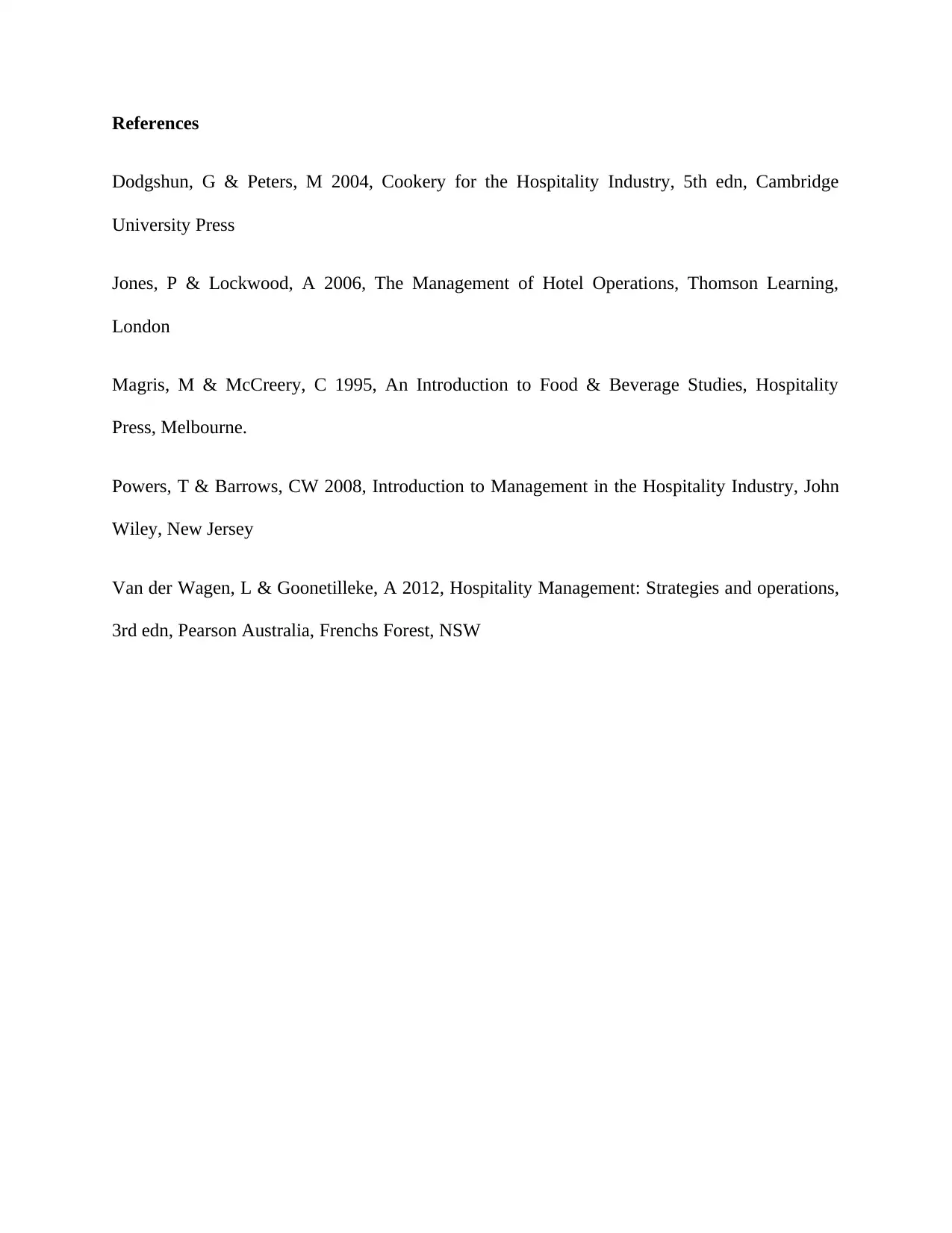
References
Dodgshun, G & Peters, M 2004, Cookery for the Hospitality Industry, 5th edn, Cambridge
University Press
Jones, P & Lockwood, A 2006, The Management of Hotel Operations, Thomson Learning,
London
Magris, M & McCreery, C 1995, An Introduction to Food & Beverage Studies, Hospitality
Press, Melbourne.
Powers, T & Barrows, CW 2008, Introduction to Management in the Hospitality Industry, John
Wiley, New Jersey
Van der Wagen, L & Goonetilleke, A 2012, Hospitality Management: Strategies and operations,
3rd edn, Pearson Australia, Frenchs Forest, NSW
Dodgshun, G & Peters, M 2004, Cookery for the Hospitality Industry, 5th edn, Cambridge
University Press
Jones, P & Lockwood, A 2006, The Management of Hotel Operations, Thomson Learning,
London
Magris, M & McCreery, C 1995, An Introduction to Food & Beverage Studies, Hospitality
Press, Melbourne.
Powers, T & Barrows, CW 2008, Introduction to Management in the Hospitality Industry, John
Wiley, New Jersey
Van der Wagen, L & Goonetilleke, A 2012, Hospitality Management: Strategies and operations,
3rd edn, Pearson Australia, Frenchs Forest, NSW
⊘ This is a preview!⊘
Do you want full access?
Subscribe today to unlock all pages.

Trusted by 1+ million students worldwide
1 out of 6
Related Documents
Your All-in-One AI-Powered Toolkit for Academic Success.
+13062052269
info@desklib.com
Available 24*7 on WhatsApp / Email
![[object Object]](/_next/static/media/star-bottom.7253800d.svg)
Unlock your academic potential
Copyright © 2020–2026 A2Z Services. All Rights Reserved. Developed and managed by ZUCOL.





